|
|
|
Sort Order |
|
|
|
Items / Page
|
|
|
|
|
|
|
| Srl | Item |
| 1 |
ID:
092336
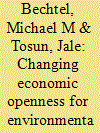

|
|
|
|
|
| Publication |
2009.
|
| Summary/Abstract |
Citizens' concerns about (international) environmental protection standards are of increasing importance to governments in industrially advanced, high-regulating countries. In almost any proposal for a trade agreement, countries with low environmental regulation standards are required to introduce higher policy standards in exchange for high-regulating countries dismantling their trade barriers and granting access to their domestic markets. Low-regulating countries often act as required and introduce legislation aimed at reducing pollution. This leads to declaratory or de jure policy convergence. But such legislative action is not always associated with de facto or actual policy convergence, since policies are not always enforced. To analyze the strategic aspect of this potential "slippage," we set up a game-theoretic model with imperfect information. In the model, a high-regulating and a low-regulating country negotiate a bilateral free trade agreement with environmental provisions. We show how potential gains from trade, policy enforcement, and reputation costs, as well as domestic demands for environmental protection affect the occurrence of environmental policy convergence through conditional trade agreements. This study thereby advances our understanding of the relationship between bilateral trade and convergence of environmental policies.
|
|
|
|
|
|
|
|
|
|
|
|
|
|
|
|
| 2 |
ID:
092347
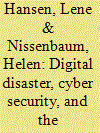

|
|
|
|
|
| Publication |
2009.
|
| Summary/Abstract |
This article is devoted to an analysis of cyber security, a concept that arrived on the post-Cold War agenda in response to a mixture of technological innovations and changing geopolitical conditions. Adopting the framework of securitization theory, the article theorizes cyber security as a distinct sector with a particular constellation of threats and referent objects. It is held that "network security" and "individual security" are significant referent objects, but that their political importance arises from connections to the collective referent objects of "the state,""society,""the nation," and "the economy." These referent objects are articulated as threatened through three distinct forms of securitizations: hypersecuritization, everyday security practices, and technifications. The applicability of the theoretical framework is then shown through a case-study of what has been labeled the first war in cyber space against Estonian public and commercial institutions in 2007.
|
|
|
|
|
|
|
|
|
|
|
|
|
|
|
|
| 3 |
ID:
092341
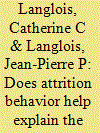

|
|
|
|
|
| Publication |
2009.
|
| Summary/Abstract |
Does attrition behavior, defined as waiting for the other side to give in despite the costs of delay, help explain the duration of interstate wars? To answer this question we develop a war and bargaining model that integrates a dynamic progression of the war and allows the rivals to make offers at any time of their choosing while they fight. The model predicts that, in equilibrium, states choose to fight without making significant offers in the hope that the other side will give in to outstanding demands. The model also predicts that each side's flow cost of war increases with the probability that the other side gives in to its demands. This is the testable consequence of attrition behavior. Our statistical analysis suggests that both challenger and defender include attrition behavior in their conduct of warfare, and that this behavioral element significantly affects the duration of interstate wars.
|
|
|
|
|
|
|
|
|
|
|
|
|
|
|
|
| 4 |
ID:
092340
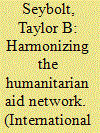

|
|
|
|
|
| Publication |
2009.
|
| Summary/Abstract |
Humanitarian aid operations save many lives, but they also fail to help many people and can have unintended political consequences. A major reason for the deficit is poor coordination among organizations. In contrast to "lessons learned" studies that dominate the literature on this topic, this article uses systemic network theory, drawn from business management literature. It presents the humanitarian aid community as a complex, open, adaptive system, in which interaction of structure and processes explain the quality of the response to environmental demands. Comparison of aid operations in Rwanda in 1994 and Afghanistan in 2001 probes the argument that the humanitarian system is becoming more effective by developing characteristics of a network through goal-directed behavior of participating organizations. The study finds development of network characteristics in the system when clusters of organizations learn to coordinate more closely, but the system is constrained by the workload of a crisis environment, lack of trust among organizations, and the political interests of donor governments.
|
|
|
|
|
|
|
|
|
|
|
|
|
|
|
|
| 5 |
ID:
092338
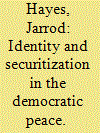

|
|
|
|
|
| Publication |
2009.
|
| Summary/Abstract |
While almost a decade old, Ted Hopf's observation that the democratic peace is an observation in search of a theory still holds validity. In particular, the mechanisms behind the democratic peace are poorly understood, making it difficult for scholars to provide a compelling explanation. Underappreciated in the existing work is the role of identity and the importance this has for driving the democratic peace. With a focus on developing a dyadic democratic peace mechanism and using a case study approach, this paper utilizes the Copenhagen School's securitization framework to examine how identity plays out in the US response to the Indian and Iranian nuclear programs. It finds that in fact identity does play an important role in how security policy is constructed. In policy terms, if the democratic peace does rely on identity to trigger the constraining norms that limit the escalation of conflict to violence, it is unlikely the democratic peace can be spread by force and it is possible that states nominally democratic can be excluded from the community of democracies if their behavior or significant other aspects of their perceived identity are at variance with the accepted democratic identity standard.
|
|
|
|
|
|
|
|
|
|
|
|
|
|
|
|
| 6 |
ID:
092339


|
|
|
|
|
| Publication |
2009.
|
| Summary/Abstract |
This paper analyzes the stability of alternative exchange rate regimes in the face of substantial capital mobility. This issue often goes under the label of the unstable middle or the two-corners hypotheses. We argue that both the issues of why the middle is unstable and how far toward the extremes of fixed or flexible exchange rates countries need to go in order to substantially reduce the likelihood of currency crises depends crucially on political economy as well as technical economic considerations. We undertake a large N empirical study that extends the currency crisis literature by using a new classification of exchange rate regimes from the IMF and taking into account the interactive effects between government strength and alternative exchange rate regimes on the probability of currency crises. We find that weak governments increase the likelihood of currency crises under any type of exchange rate regime, and as our theory suggests, this effect is strongest under adjustably pegged exchange regimes.
|
|
|
|
|
|
|
|
|
|
|
|
|
|
|
|
| 7 |
ID:
092334
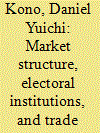

|
|
|
|
|
| Publication |
2009.
|
| Summary/Abstract |
The view that intra-industry trade is politically easier to liberalize than inter-industry trade is widely held and potentially explains key features of the global trading system. This view, however, rests on weak theoretical and empirical foundations. I argue that intra-industry trade can in fact lead to higher protection, but only where electoral institutions privilege narrow protectionist interests. I support this hypothesis with an analysis of trade barriers in 4,400 sectors in 65 countries and an analysis of lobbying in the US. My results imply that scholars should stop invoking intra-industry trade as an explanation for low trade barriers in wealthy countries and advanced manufacturing sectors. They also have important implications for the more general relationship between political institutions, collective action, and policy outcomes.
|
|
|
|
|
|
|
|
|
|
|
|
|
|
|
|
| 8 |
ID:
092342
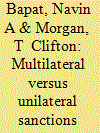

|
|
|
|
|
| Publication |
2009.
|
| Summary/Abstract |
Policymakers frequently argue that multilateral sanctions are more likely to induce a target state to alter its behavior than are unilateral sanctions. Repeated empirical studies using the familiar Hufbauer, Schott, and Elliot data set demonstrate that unilateral sanctions "work" more often than multilateral sanctions, however. In this study, we subject three theoretical explanations for this counterintuitive finding to additional empirical testing utilizing the new Threat and Imposition of Economic Sanctions (TIES) data. Somewhat surprisingly, the analyses using these new data support the intuition of policymakers; that is, multilateral sanctions do appear to work more frequently than do unilateral sanctions. Our results do support one theoretical argument, based on spatial models, that we test. This explanation holds that whether multilateral or unilateral sanctions are more effective depends on the number of issues at stake and on whether an international institution is involved. Our analyses provide support for these hypotheses.
|
|
|
|
|
|
|
|
|
|
|
|
|
|
|
|
| 9 |
ID:
092343
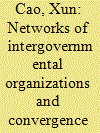

|
|
|
|
|
| Publication |
2009.
|
| Summary/Abstract |
We studied three potential causal mechanisms through which network dynamics of intergovernmental organizations (IGO) might cause convergence in domestic economic policies. First, IGO networks facilitate policy learning by providing relevant information. Second, they encourage policy emulation by creating a sense of affinity among countries that are closely connected by IGO networks. Finally, some powerful IGOs ''coerce'' their member states to adopt certain policies. We used causal modeling to test the relationships between different types of IGOs (and the causal mechanisms to which they mostly correspond) and policy convergence. The findings demonstrate the important roles played by salient IGOs such as the WTO, the EU, and the OECD, with each of them having a strong converging effect on their member states' domestic economic policies. More interestingly, we find that the cumulative effects of multiple layers of even the weakest types of IGOs have strong causal effects on states' domestic policies. Indeed, the shared memberships in IGOs with economic functions and with the minimal level of institutional capacity are not only statistically associated with, but also have converging causal effects on, countries' domestic policies. This supports the information-driven policy learning mechanism. The emulation mechanism in which IGO networks create a sense of affinity and therefore facilitate policy diffusion and convergence, on the other hand, is not supported by empirical analysis.
|
|
|
|
|
|
|
|
|
|
|
|
|
|
|
|
| 10 |
ID:
092335


|
|
|
|
|
| Publication |
2009.
|
| Summary/Abstract |
American scholars routinely characterize the study of international relations as divided between various Kuhnian "paradigms" or Lakatosian "research programmes." Although most international relations scholars have abandoned Kuhn's account of scientific continuity and change, many utilize Lakatosian criteria to assess the "progressive" or "degenerative" character of various theories and approaches in the field. We argue that neither specific areas of inquiry (such as the "democratic peace") nor broader approaches to world politics (such as realism, liberalism, and constructivism) deserve the label of "paradigms" or "research programmes." As an alternative, we propose mapping the field through Weberian techniques of ideal-typification.
|
|
|
|
|
|
|
|
|
|
|
|
|
|
|
|
| 11 |
ID:
092337


|
|
|
|
|
| Publication |
2009.
|
| Summary/Abstract |
Consideration of the effects of domestic politics on international conflict behavior often consists simply of contrasting democracies with non-democracies. One notable exception is work that links economic performance and the use of force. This link has often been addressed through use of a diversionary perspective. In this paper, we argue that more important than the alleged incentive to pursue a rallying effect when times are bad are domestic political and economic factors affecting leaders' constraints, representing some of the costs to pursuing adventurous foreign policies. We examine three sources of constraints on democratic leaders: the willingness of the constituency to support the use of force internationally; the macroeconomic preferences of the party's constituency; and an interaction of those preferences with the state of the economy. We find that in developed democracies, the political orientation of the government is a significant factor affecting the likelihood of international conflict initiation. Specifically, right governments are more likely to initiate interstate disputes; economic conditions have a significant but lesser impact.
|
|
|
|
|
|
|
|
|
|
|
|
|
|
|
|
| 12 |
ID:
092332
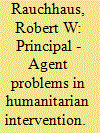

|
|
|
|
|
| Publication |
2009.
|
| Summary/Abstract |
A number of recent studies have concluded that humanitarian intervention can produce unintended consequences that reduce or completely undermine conflict management efforts. Some analysts have argued that the incentive structure produced by third parties is a form of moral hazard. This paper evaluates the utility of moral hazard theory and a second type of principal-agent problem known as adverse selection. Whereas moral hazards occur when an insured party has an opportunity to take hidden action once a contract is in effect, adverse selection is the result of asymmetric information prior to entering into a contract. Failing to distinguish between these two types of principal-agent problems may lead to policy advice that is irrelevant or potentially harmful. Along with introducing the concept of adverse selection to the debate on humanitarian intervention, this study identifies a commitment dilemma that explains why third parties operating in weakly institutionalized environments may be unable to punish groups that take advantage of intervention.
|
|
|
|
|
|
|
|
|
|
|
|
|
|
|
|
| 13 |
ID:
092346
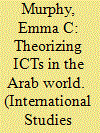

|
|
|
|
|
| Publication |
2009.
|
| Summary/Abstract |
The concept of the public sphere has become a commonly used paradigm for understanding the impact of contemporary Information and Communications Technologies (ICTs) on the political spaces of the Arab world. This article aims to explore the multiple understandings of this evolving public sphere and their shortcomings. A survey of recent research on the Arab region demonstrates inconsistencies which have arisen from an abstraction of the concept from its theoretical roots. By returning to the discourse surrounding Habermas' original ideas, including the debates which have articulated concerns arising from the possibilities of multiple and non-virtuous publics, the (re)mediating effects of contemporary ICTs, the possibilities for the social construction of new identities, and the universalism of the normative underpinnings of the public sphere, the emerging Arab public sphere is located within its global counter-part, high-lighting those of its features which represent opportunities for new forms of communicative action which have emancipatory potential. However, the article acknowledges the mutually constitutive functions of structure and identity by further locating the new landscape of intra-regional communication within the context of the global spread of informational capitalism. The evidence here suggests that the emerging Arab public sphere is already penetrated and diminished. The key to reconciling these apparently contradictory tendencies lies in the porousness of the boundaries which delimit the Arab public sphere and the manner in which it retains some autonomy from its global counterpart.
|
|
|
|
|
|
|
|
|
|
|
|
|
|
|
|
|
|
|
|
|